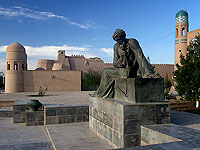 |
|
Uzbekistan - Milestones of History |
|||
|
In the sphere of agriculture, the Russian government envisaged two main goals: first - to consolidate its rule in Central Asia, and then - exploit its economic potentials for the benefit of the ruling class in Russia. Following the "Charter" of 1886 that came into force as a law in Turkestan, Russians began arriving in the area from central Russia, History reveals, they are said to have taken over the lands that belonged to local people. Besides, the Russian government paid a special attention in establishing Russian villages and settlements. This served as a pare of long-term policy of importing Russian language, culture, and way of life, in general, into the area. The cotton grown in Turkestan was significant for the Russian textile industry. Hence, the cotton cultivation had been specially taken care of, and a cotton-plant itself stayed as a main agricultural crop for the years to come. Furthermore, the cotton imported from Turkestan had been fully exempted from custom duties. But starting from 1879, 40-50 copecks were charged as a custom duty from each 16 kg of imported cotton. And the cotton-growers were offered certain privileges in taxation. The Finance Ministry has firmly supported the Russian bourgeoisie in its policy of extending the cotton cultivation in Turkestan. The economic policy conducted by the empire in Turkestan was aimed at turning it into a raw base, keep it as a market for realization of Russian goods, and finally, to exploit mineral resources of the area. Soviet rulers have continued such policy, respectively. The Caspian, Siberian, and Orenburg railway lines, which mainly linked the center of the empire with its colonies in the area, played enormous role in terms of ruthless exploitation of the mineral resources of Turkestan. Capitalism began extending in the region with arriving on the scene of numerous industrial enterprises. Local cotton served as a basis for the industrial sphere in the area. Putting their personal ambitions and economic interests ahead, Russian capitalists did not want to develop the local processing industry, but, otherwise, they have put all of the financial resources in expansion of trade. The history of peoples of Central Asia, scientific research, press, reforms in education totally served the needs of colonialists. The way of life of population kept seeing its downfall. Due to the rise of import of Russian industrial goods into the region at the beginning of the second half of the 19th century, many local craftsmen began losing their share in the market. By that time, science and technology in Turkestan lagged in its development to those in Europe. Russian invasion of Turkestan further intensified ignorance, as well as economic and cultural collapse in the area. Given such situation in Turkestan, the jadid (renovators) movement came on the scene in the region. The movement put out its literature, as well. Thus, the state of affairs in the region at that time gave birth to a new literary movement, which called for renovation both in literature and poem, propagated the idea of the struggle against Russian colonialism, gaining knowledge and education, and at the outcome, .secure the national independence. Also, the jadid schools were established. In 1916 the peoples of Central Asia launched a massive revolt for national independence against Russian tsarism. From November 1917 to March 1918, the Soviet rule was declared in the region. Thus, in 1920 the Khorezm and Bukhara people's Soviet Republics were set up. Following the national and state demarcation in Central Asia, in 1924 the Uzbek S.S.R. was organized, and in 1925 it joined the U.S.S.R as a new republic of the union. On August 31, 1991 the Uzbek people realized their inalienable right, the one of self-determination. On the Extraordinary Session of the Supreme Council, the First President of the Republic of Uzbekistan, Islam Karimov declared the independence of the Republic of Uzbekistan, a great event in the centuries-long history of Uzbek people. Thus, Uzbekistan gained its true statehood in a peaceful and parliamentary way. The will of the people is secured with the constitutional law "On the basics of the state independence of the Republic of Uzbekistan", and further confirmed by a national referendum. |

